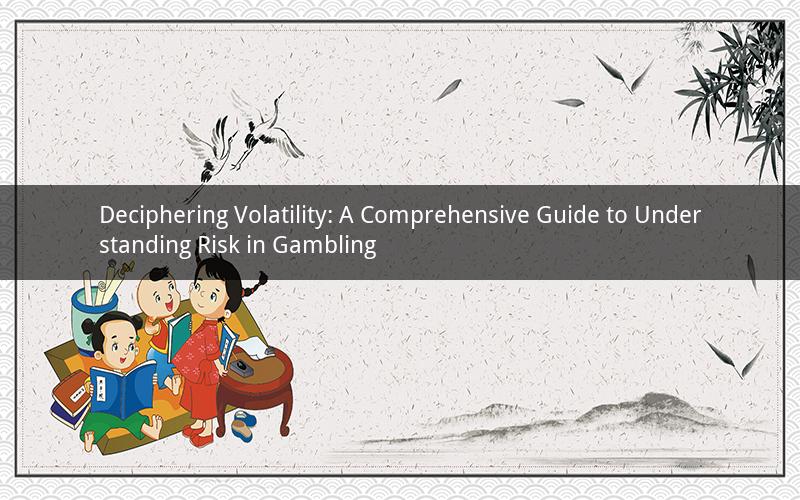
Introduction:
Gambling, a timeless activity, has captured the imagination of people worldwide. With a plethora of games and betting options available, it is crucial for players to understand the concept of volatility to make informed decisions. In this article, we will delve into what volatility means in the context of gambling and how it affects players.
Understanding Volatility:
Volatility refers to the degree of fluctuation or unpredictability in the outcomes of a gambling game. It is an essential factor that players should consider before diving into a game. Higher volatility means the game has more unpredictable results, while lower volatility indicates more consistent and stable outcomes.
Types of Volatility:
1. High Volatility:
High volatility games, such as slots with high variance, offer massive payouts but with less frequency. These games are considered risky due to their unpredictable nature. Players who are looking for big wins and are willing to take on higher risks prefer high volatility games.
2. Low Volatility:
On the other hand, low volatility games, like slots with low variance, provide frequent but smaller payouts. These games are suitable for players who seek consistent results and have a lower risk tolerance. Low volatility games can be more appealing for players looking for a steady cash flow.
Factors Affecting Volatility:
Several factors influence the volatility of a gambling game, including the game's mechanics, the odds of winning, and the size of the payouts. Understanding these factors can help players gauge the level of risk involved in a particular game.
1. Game Mechanics:
The design and rules of a game significantly impact its volatility. For example, slots with multiple paylines and bonus rounds tend to be more volatile than games with a single payline and minimal bonuses.
2. Odds of Winning:
Higher odds of winning a game typically result in lower volatility, while lower odds of winning lead to higher volatility. It is essential to check the payout percentage and odds of winning before playing a game.
3. Payout Size:
The size of the payouts also plays a crucial role in determining the volatility of a game. Larger payouts tend to be associated with higher volatility, as these games often require players to wait longer for substantial wins.
The Impact of Volatility on Players:
Volatility can have a significant impact on players, both emotionally and financially. Understanding the following points can help players navigate the risks associated with volatility:
1. Bankroll Management:
Players must manage their bankroll carefully when playing high volatility games. Since these games offer big wins, players might be tempted to spend more money than they can afford. Proper bankroll management is crucial to avoid financial strain.
2. Time Spent on Games:
High volatility games require players to invest more time and patience. It can be frustrating for players who expect immediate results and may lead to impulsive decisions.
3. Emotional Stress:
The unpredictable nature of high volatility games can cause emotional stress. Players should be prepared to handle both wins and losses calmly to avoid making irrational decisions.
4. Chasing Losses:
Players may feel compelled to chase losses in high volatility games, which can lead to further financial losses. It is important to set limits and stick to them to avoid falling into a detrimental cycle.
Frequently Asked Questions:
1. What is the difference between volatility and odds of winning?
Answer: Volatility refers to the unpredictability of a game's outcomes, while odds of winning indicate the likelihood of a particular outcome occurring. Both factors contribute to the overall risk associated with a game.
2. Can low volatility games be profitable?
Answer: Yes, low volatility games can be profitable if players manage their bankroll effectively and play consistently. While the payouts may be smaller, the steady cash flow can help players accumulate winnings over time.
3. Should I always play high volatility games for big wins?
Answer: Not necessarily. While high volatility games offer the potential for big wins, they come with higher risks. It is important to consider your risk tolerance, bankroll, and playing style before choosing a game.
4. How can I minimize the impact of volatility on my bankroll?
Answer: To minimize the impact of volatility on your bankroll, it is essential to set a budget, stick to it, and avoid chasing losses. Additionally, choosing games that align with your risk tolerance and playing style can help manage the impact of volatility.
5. Is there a way to predict the volatility of a game?
Answer: There is no foolproof method to predict the volatility of a game. However, players can research and analyze the game's mechanics, odds of winning, and payout percentages to make an educated guess about its volatility level.
Conclusion:
Volatility is a crucial aspect of gambling that players must understand to make informed decisions. By considering the types of volatility, factors affecting it, and its impact on players, players can navigate the risks involved and make the most of their gambling experience. Remember to always play responsibly and within your means.